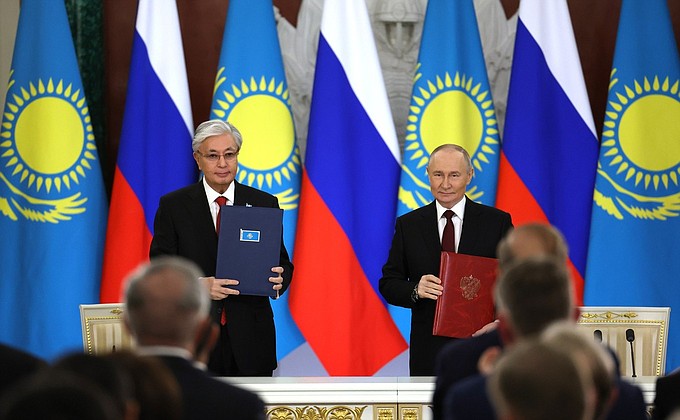As part of the state visit by the President
of the Republic of Kazakhstan to the Russian Federation, an extensive package
of intergovernmental and interagency documents was signed. Vladimir Putin and Kassym-Jomart
Tokayev signed the Declaration on the Transition of Interstate Relations between
the Russian Federation and the Republic of Kazakhstan to the Level of Comprehensive
Strategic Partnership and Alliance.
* * *
President of Russia Vladimir Putin: Mr President, ladies and gentlemen, friends,
We are delighted to welcome in the Kremlin the President of the Republic of Kazakhstan who is in Russia on a state visit.
Our talks were held in a business-like and constructive atmosphere and yielded tangible results which is
fully consistent with the truly friendly and neighbourly relations between
Russia and Kazakhstan. We had a detailed discussion on bilateral cooperation in all its aspects, and shared views on pressing regional and international
matters.
The key outcome of the visit is the declaration on the transition of relations between Russia and Kazakhstan to an entirely new and more advanced level of comprehensive strategic partnership and alliance. Also, an extensive package of intergovernmental and interagency
agreements and memorandums was signed laying out specific long-term provisions
for joint effort in terms of security policy, trade, investment, culture and humanitarian affairs.
Obviously, economic ties were a priority of these talks. Last year, trade reached US$28.7 billion, which
accounts for a fifth of Kazakhstan’s foreign trade.
For Russia, Kazakhstan is one of the biggest trade partners within the Commonwealth of Independent States and across
the Eurasian space in general. Moreover, our mutual trade is structured in a way that enables us to constantly diversify it by increasing the share of non-primary goods. As for the share of national currencies
in our mutual settlements, it already exceeds 96 percent, which enables us to make
our business transactions immune to negative external impacts, including political
factors.
Russia is a leading investor in Kazakhstan, with
cumulative capital investments totalling approximately US$10 billion. Over
17,000 enterprises with Russian participation operate on the Kazakhstani
market, and the two countries are implementing around 70 major joint projects
across all key sectors of Kazakhstan’s economy.
Bilateral energy cooperation is steadily
advancing. The majority of Kazakhstan’s oil exports transit through Russia,
while Russian oil is shipped via Kazakhstan to markets in Asia.
In turn, Russia imports Kazakhstan’s coal, and the two nations have established mutual electricity supplies. Russia is also
participating in modernising thermal and hydroelectric power facilities in Kazakhstan.
I should note that for many years, Gazprom has
been stably supplying gas to consumers in Kazakhstan. Currently, opportunities
are being explored to expand these supplies, particularly to the northern and eastern regions where Kazakhstan’s major industrial capacities are
concentrated.
Companies from both countries are successfully
collaborating on projects in the automotive industry, agriculture, agricultural
engineering, and mineral fertiliser production. There are also plans under
discussion to step up cooperation in the chemical industry and rare earth
mining.
Russia and Kazakhstan are connected by a network of key Eurasian transport routes. Our countries are working to increase
the capacity of automobile border crossings, while freight traffic by air and water is expanding, including across the Caspian Sea and along the Irtysh
River.
Significant new prospects are emerging with the development of the International North-South Transport Corridor, which runs
from Russia to the Indian Ocean. The eastern branch of this route crosses
Kazakhstan before connecting to Turkmenistan and Iran.
Close cooperation continues in space research,
including the joint operation of the Baikonur space centre. The Baiterek
project, which envisions creating a new rocket and space complex for launches
of the Russian Soyuz-5 vehicle, is underway, with its first launch expected
before the end of this year.
Regional partnerships significantly contribute
to the practical development of our bilateral ties. The 21st Russia-Kazakhstan
Interregional Cooperation Forum is currently being held in Uralsk. President
Tokayev and I have just addressed the participants of its plenary session via
videoconference. The forum focuses on the pressing issue of training professional,
highly qualified personnel for various economic sectors. It brings together
representatives from more than thirty Russian regions and their counterparts
from across Kazakhstan.
To be continued.
